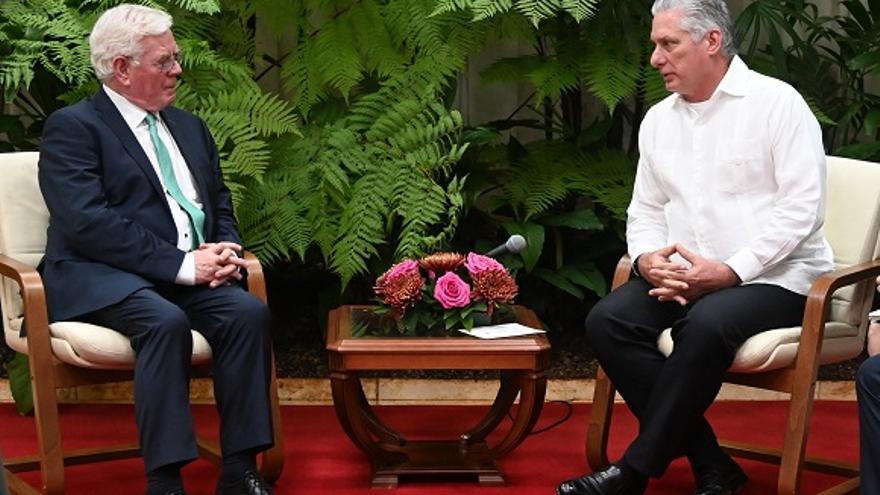
![]() EFE (via 14ymedio), Madrid, 25 November 2023 — The repression of dissent, the violation of political rights and the situation of prisoners sentenced for the protests of 11 July 2021 (11J) were the main complaints from Cuban civil society to the delegation of the European Union (EU) who visited the country this Thursday and Friday.
EFE (via 14ymedio), Madrid, 25 November 2023 — The repression of dissent, the violation of political rights and the situation of prisoners sentenced for the protests of 11 July 2021 (11J) were the main complaints from Cuban civil society to the delegation of the European Union (EU) who visited the country this Thursday and Friday.
EFE spoke with three of the up to eight members of civil society that it has identified who met privately with the head of that community delegation, the EU Special Representative for Human Rights, Eamon Gilmore.
In addition to Gilmore’s official meetings, in which he met with representatives of the Ministries of Foreign Affairs, Interior and Justice, the EU diplomat’s agenda included interviews with relatives of prisoners, independent journalists, LGBT activists and critical intellectuals.
Professor Alina Bárbara López Hernández told EFE “I found him impressed with what he saw. If you will, alarmed. Hopefully he has positioned himself well,” she said, after having had a telephone conversation with Gilmore because she could not travel to Havana due to a medical condition.
“I found him impressed with what he saw. If you will, alarmed. Hopefully he has positioned himself well”
This Marxist historian and editor, who defends “socialist ideas” and is against the blockade (embargo), will be tried next Tuesday for an alleged crime of disobedience. López could be sentenced to one year in prison.
López Hernández told Gilmore that her case is due to her “deep criticism of the single-party system,” “the State ideology,” the Government’s constitutional breaches, “the repressive attitude” of the authorities and “the control of the economy by the military. “This is inexcusable for this Government,” she said.
She also denounced that Cuba is “a factory of new prisoners” and that we should not limit ourselves to asking for the release of people currently in prison, but rather “understand that the system generates these reactions.”
The ’11J’ prisoners were, according to Gilmore himself, a “predominant” topic in his institutional conversations. On Friday afternoon he met for two hours with about five relatives.
One of them, who spoke on condition of his anonymity, told EFE that the meeting was very positive and that they found him to be “receptive” and “moved” by the complaints made to him. The relative also emphsized that going to the European embassy was not an easy task, because there were State Security agents to prevent his passage.
“It was good, very good. (He was) very receptive, wonderful. And at all times he told us that everything is being done is for the freedom of political prisoners,” summarized this relative, who claims that Gilmore referred at all times to those imprisoned as “political prisoners.”
“(He told us) that he really wanted to see the family members in person and listen to them. I told him about the torture, about everything. He understood us and hugged us,” he concluded.
The Island is currently suffering a “humanitarian crisis” and it is “timely” for the Cuban Government to have “a powerful interlocutor”
Journalist Maykel González Vivero, who also met with the European diplomat, highlighted to EFE that Gilmore “took special interest in the political prisoners.” “I told him that I had arrived in Cuba at a particularly paradoxical time. On the one hand, since the approval of the 2019 Constitution, the country recognized more citizens’ rights than ever before. However, in these same years, the Government also had violated the human rights of a greater number of people,” he said.
He argued that the Island is currently suffering a “humanitarian crisis” and that it is “timely” for the Cuban Government to have “a powerful interlocutor” to talk about human rights. “We need to keep the doors to the world open,” he said.
In several conversations, the case of Luis Barrios Díaz, a 36-year-old prisoner convicted of participating in the 11 July protests and who died last Sunday, was addressed. According to family, friends and NGOs, the young man died from a respiratory condition that he allegedly developed in prison and that was not adequately treated.
Activists and NGOs have reiterated in recent days their criticism of the Cuban Government regarding Gilmore’s visit and some have insisted on the need for the European diplomat to visit Cuban prisons, something that has not happened.
____________
COLLABORATE WITH OUR WORK: The 14ymedio team is committed to practicing serious journalism that reflects Cuba’s reality in all its depth. Thank you for joining us on this long journey. We invite you to continue supporting us by becoming a member of 14ymedio now. Together we can continue transforming journalism in Cuba.
